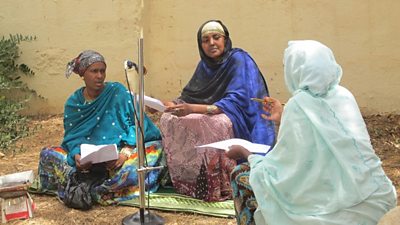Downloads
Publication date: April 2013
Summary
- Â鶹ԼÅÄ Media Action’s UNICEF-funded project in Somalia supports nutrition, hygiene and health seeking among young mothers, husbands and older women through the production of radio drama and discussion programmes.
- A longitudinal qualitative panel study with young mothers, husbands and older women in Somaliland has been established to track the impact of the intervention over time.
- Findings from the first round of the longitudinal study provide a detailed picture of the knowledge, beliefs and practices of young mothers regarding six key project indicators. By highlighting misconceptions and gaps in knowledge and efficacy, they will support the creation of a clear baseline for subsequent exploration of the programme’s content and impact.
Context
Somalia, particularly the South Central region, has been without a stable functioning government and in a state of protracted civil war for two decades. In 2011, the worst drought in 60 years hit the country and a state of emergency related to the famine was declared in South Central, where maternal and child mortality rates are both very high. Radio is the most dominant type of media used in Somalia and remains a crucial source of information for a vast proportion of the population.
The project
The drama and discussion programme Tiiraarka Qoyska (Pillars of the Family) focuses on the following priority behaviours:
- More women initiating breastfeeding within an hour of birth (colostrum feeding)
- More babies exclusively breastfeeding for six months
- More caregivers practising appropriate complementary feeding for their children after six months
- More caregivers increasing their child's intake of food and fluids when sick including use of oral rehydration solution (ORS) and zinc
- More caregivers washing their hands with soap or ash before eating, before feeding children and after any toilet activities
- More caregivers safely disposing of faecal matter
Research methodology
The study employs a longitudinal qualitative panel design, where research is repeated with the same group of participants at regular intervals. The panel was established in July 2012 and in-depth interviews were completed with 60 young mothers (those with a child under six months, pregnant, or married and of reproductive age), husbands and older women. The sample was divided into three conditions, across three locations: non-listeners in rural Borama (a control group); regular listeners in Burao; and listeners in Gabiley who also attend listener groups during which they listen to and discuss the programme. The panel will allow the impact of the drama and discussion programme to be tracked over time.
Findings
The first round of research, completed prior to the launch of the programme, measured young mothers’ reported practices, knowledge, attitudes, beliefs, and efficacy in relation to the six priority health behaviours above. Four subsequent waves will track the same indicators over time among the panel members to explore the impact of exposure to the radio programming.
Many young mothers did not report initiating breastfeeding within an hour of delivery as is recommended practice. Young mothers also had limited knowledge of colostrum and the health benefits it provides.
Young mothers do not exclusively breastfeed their child before the age of six months, and they have poor knowledge about the benefits that exclusive breastfeeding gives their baby.
Many young mothers know that a child should be given additional foods at six months. However not all foods mentioned were appropriate and some, particularly vitamin-rich foods, are missing. Diet is also influenced by the family’s financial situation, which is mainly affected by the husband’s employment status. Other caregivers (husbands and older women) also suggest that the same types of food are suitable for children.
Knowledge of appropriate action in the case of child sickness and diarrhoea is better: young mothers report that ORS should be given to their child; disagree that breastfeeding should stop; and agree that fluid intake should be increased. Sanitation practices for adults and children are mostly dictated by whether or not they have access to appropriate facilities in their community. Young mothers are aware of the health consequences of bad sanitation practice; however, some do not know that the practice of open defecation could have an impact on their or their children’s health.
Common belief: It is common practice for young mothers across all groups to give water in addition to breastfeeding babies under six months old because they believe that the baby will be thirsty. Some also give animal or powdered milk.
Implications
These findings from the first round of longitudinal research demonstrate widespread behaviours, knowledge levels and misconceptions in relation to the six indicators the project seeks to address. This information provides important input for the development of the radio drama in terms of the beliefs, practices and knowledge areas to target and sets the scene for subsequent evaluation of its impact.
